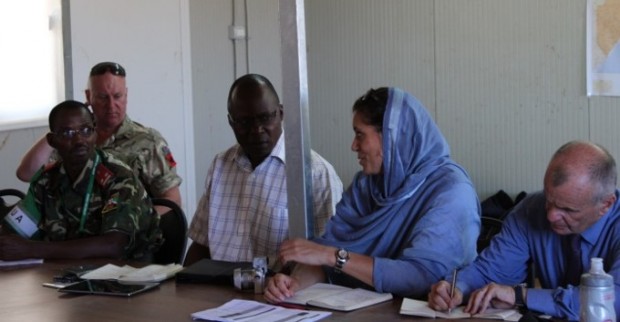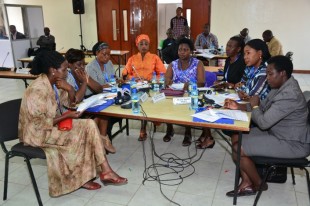
Millions of people across the world are affected by the destruction of war.
Women and children are the worst hit casualties of conflict, with rape and gender-based violence being used as weapons, particularly by terrorists.
Recognising this tactic, the British Peace Support Team in Eastern Africa (BPST(EA) has been raising awareness and helping to eradicate the problem by training military, police and civilian instructors in Kenya and neighbouring countries.
 The team has been helping train regional armies such as Kenya, Uganda, Ethiopia and Burundi for peace support operations for the last 15 years.
The team has been helping train regional armies such as Kenya, Uganda, Ethiopia and Burundi for peace support operations for the last 15 years.
The principal peace-keeping training centre which the UK and BPST(EA) support delivers 38 different courses: these range fromlogistics to mediation and negotiation to civilian protection.
Their work adapts to the changing tactics of terrorism, and as part of this, they have developed and delivered a course that aims to prevent sexual and gender-based violence (SGBV) in conflict.
Colonel Richard Leakey is the Commander of the British Peace Support Team based in Nairobi.
He said:
‘Our job is to make sure that instructors are fully qualified to train those under them to take steps to prevent sexual and gender-based violence from being used as a weapon of war in the region.
‘Although it difficult to measure the direct impact of our training, there is no doubt that these courses make a difference through the feedback we get.
‘When we started running this course we saw that our trainees’ level of understanding of sexual and gender-based violence issues was very low, but we’ve seen that change. Their understanding is now much greater and we can see that awareness is growing.’
A way of combating this type of violence from being used as a weapon is to empower women and give them a voice in society. Having identified that around the world, women are negotiating ceasefires, mediating between warring parties, and rebuilding societies ripped apart by conflict.
Col Leakey and his team make sure that adequate gender expertise and funding (from the UK) for gender equality work is more consistently available.
One of Col Leakey’s successes is the development of African military instructors (such as Major Renee) who has attended BPST(EA) courses and now works as an instructor in her Army training SGBV trainers.
It is officers like Major Renee, that the BPST(EA) is trying to recruit and train to spread the message about SGBV and its negative effects. Indeed Major Renee has trained one such officer and the two of them will be supporting BPST(EA) training over the next few weeks.
Despite the growing message and the changing behaviour towards women, more needs to be done. The BPST(EA) increasingly incorporates SGBV modules into all its training events across the region.
Col Leakey’s observation is that the UK is really leading the way on ending sexual violence in conflict training across the region with its sponsorship of 5 major courses in 15/16 and at least 5 programmed for 16/17:
‘We’re now designing the syllabus for a course to be rolled out in Democratic Republic of the Congo next year which will be a first for us and something we’re really excited to have been asked to do.’
